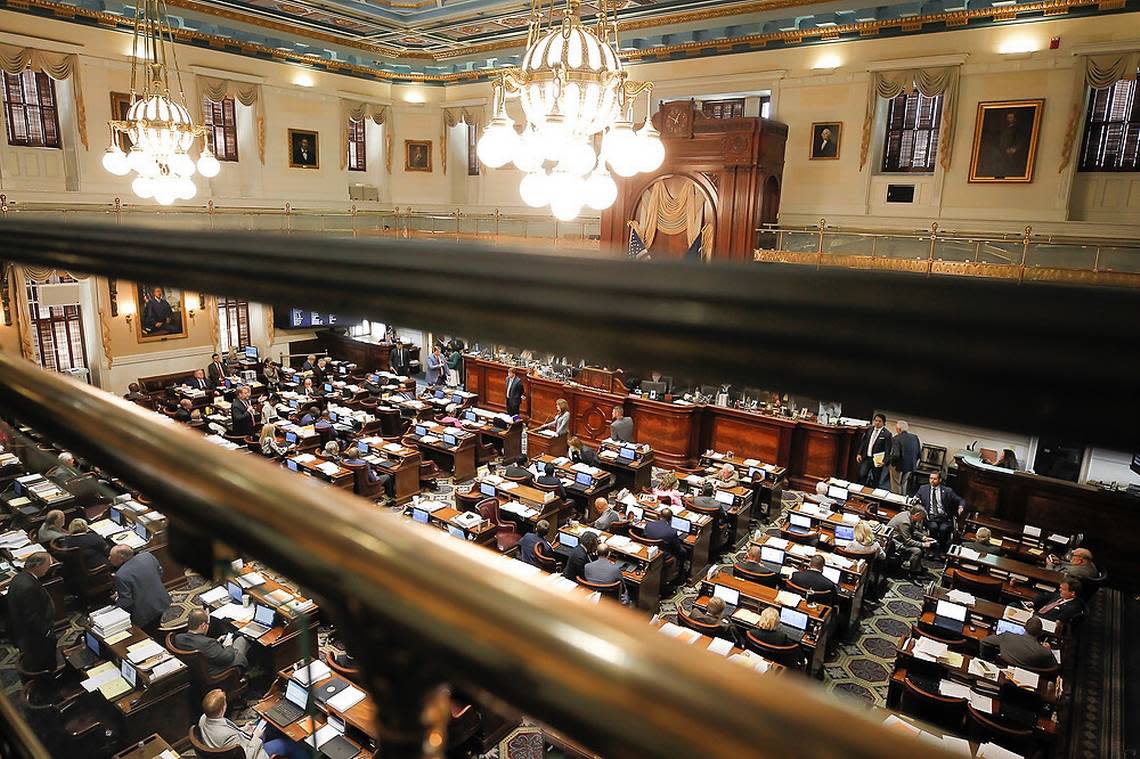SC House passes its judicial election reform plan. Here’s how it differs from Senate

- Oops!Something went wrong.Please try again later.
State House members approved their version of an effort to change the screening process of how judges in the state are elected.
It’s different from the state Senate’s version of S. 1046 passed earlier this year and most likely sets up the bill to head to a conference committee as the number of days remaining in this year’s session dwindles.
Debate on how the state elects judges has been under scrutiny because of the perceived undue influence of lawyer legislators have over judges.
“This has been a subject matter that has received a lot of attention over the last year or so,” said state Rep. Jay Jordan, R-Florence.
Debate on changing how the state screen’s judicial candidates takes place as a spot on the state supreme court needs to be filled.
An election for a state Supreme Court position is scheduled for June. Screenings of candidates by he Judicial Merit Selection Commission are scheduled for Wednesday and Thursday and up to three candidates are expected to be put forward for consideration by the General Assembly.
Both versions include executive branch involvement by allowing the governor to appoint members to the JSMC.
The House version calls for a 13-member commission, four appointed by the House speaker, two appointed by the Senate president, two appointed by the Senate judiciary chairman, and five appointed by the governor. One of the governor’s appointees would be a retired judge who would serve as the chair of the commission.
One member appointed by the Senate and one appointed by the House would not be members of the chamber, but should be a member of the bar and have 10 years of experience in practicing law.
It ensures non-lawmakers would have a majority when picking judges.
But House Minority Leader Todd Rutherford, a practicing attorney, was one of six House members to vote against the bill. He was concerned about having a majority of non-lawmakers sitting on the JMSC.
Rutherford, who has served on the JMSC for 10 years, defended the performance of the commission especially in vetting candidates and removing unqualified judges.
Rutherford said the decision is going to allow for people to be elected who may have hidden agendas, and no one will know about it until they are in position.
”If you want to see who somebody is, give them power,” Rutherford said. “Until they have a little bit of power, you really have no clue who you’re dealing with. And what you don’t want to do is find out who you’re dealing with when you’re electing the third branch of government
Rutherford emphasized there is no way to know about conflicts of interest until the choice is made.
”Where it goes in terms of judicial elections and electing judges is straight to hell if any one of these passes, because if you can’t tell me that the product is flawed, why are you tinkering with the process?” Rutherford said. “If none of the judges are the problem then what are we talking about?”
The House version also addresses magistrates, allowing them to stay in holdover status for up to 14 days instead of indefinitely waiting for a replacement to be named. The House version allows magistrates to hear cases where a award may be as high as $25,000, which would be up from $7,500.
Magistrates also would go through a JMSC screening process that does not include House members.
“From what I could tell this is far superior than what the Senate has sent over to us,” said state Rep. Russell Ott, D-Calhoun, who is running for the state Senate this year.
State Rep. Tiffany Spann-Wilder, D-Charleston, said increasing the magistrate limit from $7,500 will lead to the wild-west in magistrate court.
“You will have more cases, will you have more qualified magistrates to handle cases,” Spann-Wilder said.
State Rep. Gilda Cobb-Hunter, D-Orangeburg, brought up concerns about a lack of diversity among current judges and whether the legislation encouraged diversity.
Jordan said the committee clearly wants diversity, and sees it as a good thing.
While Cobb-Hunter’s point was valid, he said, it’s a point they’ve addressed through pending legislation.
“I think if you look back at the history of the last couple sessions, we have paid attention to diversity when it comes to different layers of courts in South Carolina,” Jordan said. “It would be simplistic to look at one court in one race, or even a handful of races and not consider all the layers of courts in South Carolina.”
The Senate version requires a judicial candidate to receive a majority of the House and majority of the Senate to be elected.
Currently judges are elected by a majority of the 170-member general assembly.
The Senate version also increases the number of people who sit on the JMSC from 10 members to 12. Four would be appointed by the governor, four by the Senate and four by the House.
Both chambers also want to change how many candidates for a judicial position can be put in front of the General Assembly. The Senate wants to raise the limit from three to six candidates. The House wants to remove the cap all together, and have the JMSC purely serve as committee that screens candidates and determines if they are qualified.

